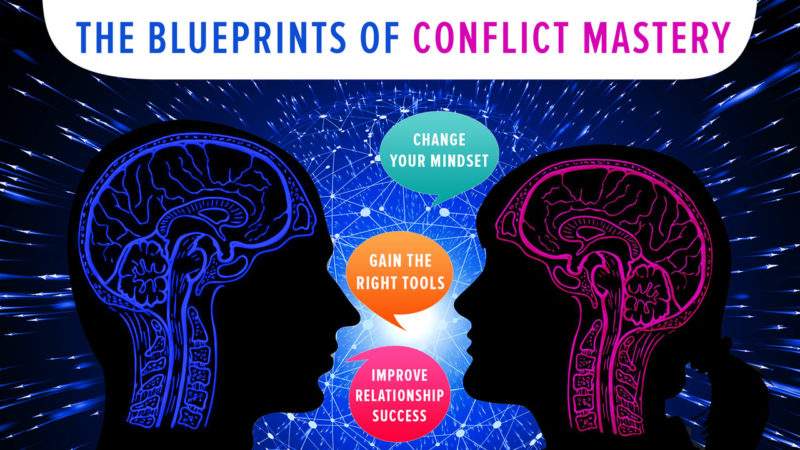It is often said that people rather die than do public speaking. I would like to add that people avoid conflict even at a high cost to their relationship. Most people shy away from conflict because they fear losing the relationship, or they have no idea how to deal with it healthily. When the elephant is in the room, you have to deal with it since it is way too large to evade. In this blog post, I want to share what I call the “Blueprints of Conflict Mastery.” This includes 7 tools that you need to gain relationship success. These tools will not only enhance your relationships, but it will alleviate some of your relational stress since you will be resolving conflict. Let’s get started with the 7 tools that are a relationship game-changer.
1. Attack the issue, not the individual– Language is so important when you are dealing with conflict. Saying the wrong thing can escalate a discussion right from the start. If you use the “You” message instead of the “I message,” someone can easily be offended. The word “You” sounds like you are pointing your finger in the other direction. It can appear accusatory and cause others to go on the defense. Once this occurs, the other person tends to see the conversation in a negative light. Remember to “speak without offending and listen without defending.” There is a scripture that reminds us to be swift to hear, slow to speak, and slow to anger (James 1:19). One sign to recognize is when we go into attack mode, we often talk louder than usual. This is the time to pace yourself, take a deep breath if necessary, and slow yourself down. There is nothing wrong with getting angry because anger is a natural emotion. How we deal with anger is the real challenge. Avoid dealing with anger reactively. This is why it is so important to slow ourselves down so that we will not say something impulsively that we will later regret. To do this, we need self-awareness and self-management.
2. Self-Awareness and Self-Management– Recognizing your strengths and growth areas as it pertains to your level of emotional intelligence is critical. “Emotional Intelligence,” the name of the best-selling book by psychologist Daniel Goleman, is still relevant today. The five areas are: 1. Self-Awareness 2. Self-Management 3. Self-Motivation 4. Empathy and 5. Social Skills. Since all areas are beneficial, I listed all five, but we will focus on two specific ones (self-awareness and self-management). You have to learn to recognize your emotions as they are happening, and this is known as self-awareness. The reason this is so important is so that you can change your negative pattern of reactivity. Also, when you are dealing with conflict, it is essential to manage yourself when your hot buttons are being pushed, and you find yourself losing control. When you have effective strategies in place, you have a better chance of mastering your own emotions before dealing with someone else’s emotions. This is known as self-management. Self-management is the ability to control oneself. This is not easy, but it is greatly needed to deal with conflict. Pay attention to the changes in your body’s responses and the intonation in your voice to know when you are escalating. Remember to pause and take a moment to get yourself together.
3. Intonation and body language– You can say the same thing in two different ways and get a completely different reaction. When your voice is high pitched, or you are screaming, you are likely to escalate the other person. On the other hand, if you remain calm, you may influence the other person to calm down. One tone may make someone responsive and another tone may cause someone to become reactive. Think about some of the conversations in your life that escalated. What did you notice about them? What was the person’s tone like? Did you feel like his or her tone was inviting a discussion or argument? What kind of story was his or her body language telling? Pay attention to how your body responds (heart racing, hands trembling, pitch in voice goes up). Your body’s response usually gives you a clear indication that the conversation is escalating, and you need a time out before things reach a level that may cause regret. At this point, you need to redirect yourself by taking a deep breath. Excuse yourself momentarily or say the magic words that someone is longing to hear, I can understand your point, or I hear what you are saying (this does not mean that you agree). Instead of going back and forth in dialogue, it may be helpful to interject statements that will change the tone of the discussion.
4. The Power of a Positive No- Can you say no without using the word “No?” The truth is no one likes the word “No.” Even toddlers cry and throw tantrums when they hear the word “No.” Adults are no different. Some adults may become passive-aggressive, others may become distant or withdrawn. People often feel rejected when they hear this word. Could it benefit you to learn how to say “No” without using the word “No?” William Ury, the co-founder of Harvard’s program on negotiation, has written an excellent book called “The Power of a Positive No.” He teaches us how and why we need to say “No.” Some people say yes to everything, which is not healthy or in their best interest. It often leads to a lot of regrets, burn out or poorly managed commitments. William Ury suggests that “You have to empower your Yes, so that you can feel comfortable saying No.” This means that if you know that you already made a commitment that is meaningful to you and it will cause you to disappoint others, then that empowers your yes so that you can have a reason to say “No.” Since people feel rejected by hearing the word “No,” choose your words carefully. If possible, leave off negative words such as unfortunately, to end the conversation on a positive note.
Let’s say your boss keeps adding more tasks to you and you are short with time. Say, since the deadline for the current project is approaching, it is difficult to take on additional tasks right now. I know this project is our company’s top priority, right? I will complete the next task when this is done. Does that work? Like this, we are affirming our intention and explaining why we are saying no. Another example, if your relationship partner wants to go on a trip that your budget doesn’t allow kindly say, our finances will not allow us to go on the cruise this year, let’s plan for next year. Can we search for a more affordable getaway this summer? Do your best to give the person the power to agree or have the final say. Lastly, you are giving the person a choice to be a part of the solution. This prevents the other person from feeling rejected, which will turn reactivity into responsiveness.
5. Understanding the power of win-win – In one of our all-time best sellers “The 7 Habits of Highly Effective People,” Stephen Covey discusses the six paradigms of human interaction:
1. Win/Lose
2. Lose/Win
3. Lose/Lose
4. Win
5. Win/Win
6. Win/or no deal
These principles still apply in business transactions or in a personal relationship. Relationships do not thrive under the win/lose paradigm. In relationships we should always seek for mutual benefits in all human interactions. This will take a little more effort to help both parties feel good about the final decision. When each person feels a sense of commitment to the action plan, they are more likely to follow through with it and not feel like they are giving up all of what they desired. One way I do this with clients is, if a couple is split on how they should handle a situation that they are stuck on, we make a list of the solution they were each married to, and then I ask them each to come up with more alternative solutions. I then ask each person to rate each solution from 1 to 10, with 10 being the highest of how right that choice would be. The solution with the highest combined score wins. Since they both agreed on it, the best solution as a team is more meaningful and more likely that they will adhere to it. It is no longer about a winner and a loser. A win/win may mean it is not your way or my way, but together we came up with an even better way. This requires both persons to cooperate and have a meeting of the minds. This is what Steven Covey calls “Synergy.”
6. Use Reflective Listening and Paraphrasing- Have you ever had a heated discussion only to realize that you were both saying the same thing just in a different way? It is challenging to listen and talk at the same time, but yet we do it and somehow think it works. It is essential to be present during a conversation so that you can be in the moment and listen to what the other person is saying. If you are constantly thinking about rebuttals and what you are going to say next, that means you are not fully present. One way to do this successfully is to slow your thoughts down and listen attentively. Look the other person in the eyes as he/she is talking to give them your undivided attention. When he/she is done speaking, you can paraphrase what you heard by saying, correct me if I’m wrong, what you are saying is… If you are practicing reflective listening, this helps you to stay present during the dialogue and avoid misinterpreting what you heard. This also helps deescalate a conversation that is starting to escalate.
7. Let’s agree to disagree– This is one of my favorite sayings, “let’s agree to disagree.” Some conflicts are pointless. The more you share how you feel, the more polarized you both become-this often happens when we speak about politics. At a certain point, you need to say, “let’s agree to disagree” and move on. Losing a relationship over someone’s opinion is not worth it. Everyone is entitled to his or her own opinion, whether we agree with it or not. People should not be bullied or overpowered to agree with us just because we feel like they should agree with us. Some perspectives will make you reactive and quite frankly even feel sick. That’s why I have my students to repeat often, “I am a professional at all times, I am also a person of character, and I have a responsibility to regulate my emotions.” Some things in life we do not get a take two on. Exploding is one of them. The conversation should not be about win or lose, nor should any discussion cause you to end a meaningful relationship. Remember to pause, take a deep breath and ask yourself, is this worth it?
I hope you enjoyed reading about this topic. If you liked this article remember to give it a like and even share the post. Feel free to share your comments or other topics you would be interested in reading about. I value your feedback!



